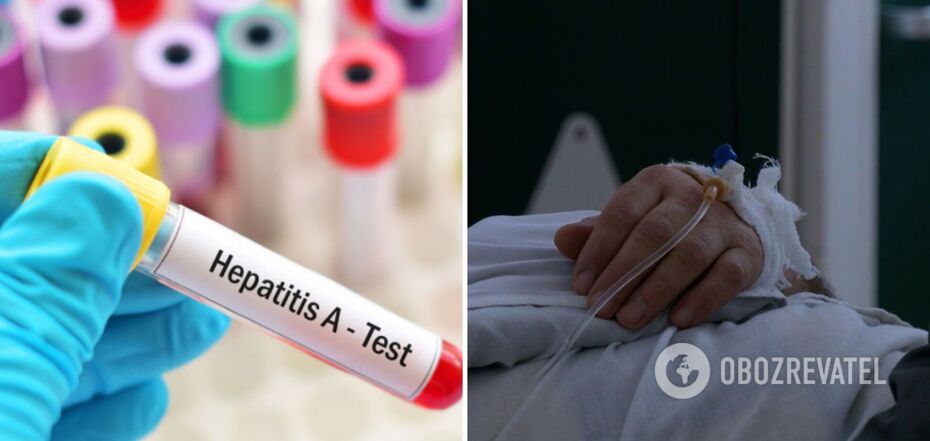Society
Hepatitis A has already been detected in Ivano-Frankivsk: how to protect yourself
Hepatitis A has already been detected in Ivano-Frankivsk. As of November 1, seven people have already been hospitalized in the regional infectious diseases hospital. Namely, four adults and three children.
This was reported by Nataliia Domina, Deputy Director General of the medical institution, to Suspilne. According to her, all the patients are from Ivano-Frankivsk.
"The children are six to seven years old. Some are in the 5th and 6th grades. Their condition is of moderate severity. There are no serious ones. Some patients were hospitalized on October 31 and November 1," said Demina.
According to Tetiana Dzhus, Deputy Director General of Ivano-Frankivsk Regional Center for Disease Control and Prevention, 12 people have contracted hepatitis A in the region since the beginning of this year. One of them was a child.
These were intermittent cases recorded in Ivano-Frankivsk, Bohorodchany, Dolyna, and Nadvirna communities.
"The number 12 does not mean anything. But from the point of view of epidemiology, we are at the foot of the peak of the incidence of viral hepatitis. Especially hepatitis A because it has a cycle of five to seven years. The last outbreaks of this disease were registered in 2017-2018. Compared to 2022, there is an increase in the incidence," added Jus.
She also noted that the Ivano-Frankivsk region has conditions for the spread of this infection.
"This is because, in general, the intensity of the epidemiological process in our region is on average higher than in Ukraine. Hepatitis A is a viral infection that affects the liver. This disease has a fecal-oral transmission mechanism. Transmission factors include water, food, dirty hands, and personal belongings. It is a disease with a fecal-oral mechanism of transmission can be treated as any acute intestinal disease. Therefore, it is necessary to follow basic hygiene requirements - wash your hands after visiting restrooms and public places, and do not drink water of unknown origin," said Juice.
At the same time, she added that viral hepatitis is a seasonal disease. The incubation period of hepatitis A lasts up to 28 days. But it can also last three months.
"It depends on the patient's infectiousness. The most dangerous thing about this disease is that after recovery, a person carries the hepatitis A antigen for the rest of his or her life. In addition, this disease affects the liver," the expert said.
Symptoms of hepatitis A include nausea, vomiting, and increased weakness.
Dzhus advises to call a family doctor at home immediately or seek medical help yourself.
"Because many people in the prodromal period do not seek medical care, and they are the most contagious to people around them. During the prodromal period, you can take a blood test for an enzyme-linked immunosorbent assay, which determines whether a person has hepatitis A by class M immunoglobulins," said Jus.
She explained that people at risk of hepatitis A are those who are in direct contact with the factors that spread hepatitis A.
Namely, employees of water utilities and the food industry, as well as children attending educational institutions and military personnel.
Is there a vaccine against hepatitis A?
According to Dzhus, hepatitis A is not a vaccine-preventable disease, but vaccination against the disease is recommended for high-risk groups.
So far, Ivano-Frankivsk Regional Public Health Center has received 200 doses of adult and 50 doses of children's vaccine, and some of it was transferred to Vinnytsia region, where an emergency situation was declared on October 31 due to the hepatitis A outbreak.
Jus emphasized that a person who has been in contact with a patient with hepatitis A must be vaccinated within seven days. If the vaccination is received later, reinfection may occur.
How hepatitis A is transmitted:
- by eating contaminated food or water that may contain feces from infected people;
- through poor personal hygiene;
- when an infected person prepares food for all family members;
- during certain types of sexual relations.
It is also worth knowing that the hepatitis A virus persists in water for 3 to 10 months, in feces for up to 30 days, and in a dry environment at room temperature for a week. It dies after 5 minutes of boiling.
The risk factors for hepatitis A are inadequate sanitation; untreated water; drug use; living with an infected person; sexual contact with a person who has hepatitis A; and travel to an area with a high epidemic.
The following rules should be followed to prevent hepatitis A:
- washing hands before eating and after each visit to the toilet;
- drinking only boiled water;
- washing vegetables and fruits.
As OBOZ.UA previously reported, anti-epidemic measures have been stepped up in Vinnytsia region due to the outbreak of hepatitis A. The spread of the disease has been defined as an emergency situation at the regional level. Mobile medical teams have already begun emergency vaccination of people who have been in contact with the sick.
Only verified information is available on our Telegram channel OBOZ.UA and Viber. Do not fall for fakes!



























